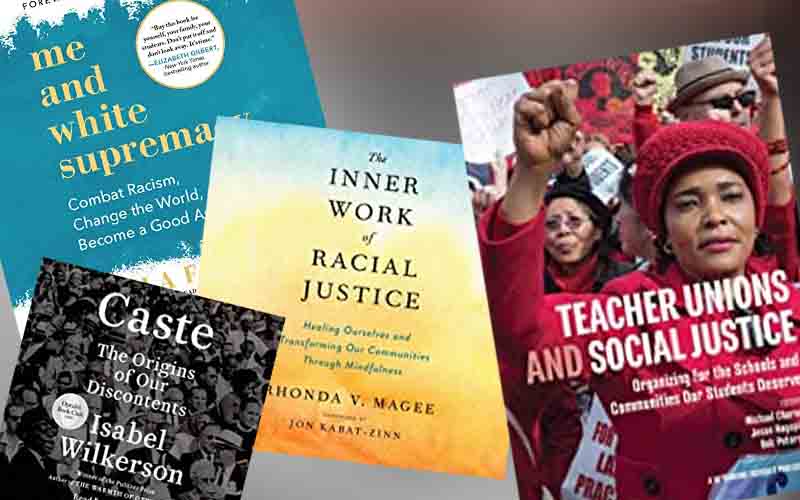TRENTON, NJ – The NJEA, New Jersey’s largest public teachers union has published their summer reading list for their members statewide. You can forget about curling up to a good classic novel like Catcher in the Rye and The Great Gatsby. Instead, if you’re a teacher in New Jersey, the NJEA wants you to continue exploring your inner wokeness.
The union has come under fire this week after allowing an associate of a convicted New Jersey cop killer to speak at a recent seminar.
Here’s what the union had to say to about which books to read this summer:
Following a year of reinventing ourselves as educators, summer vacation lies just beyond the horizon. The proverbial “sit back and relax” seems more important than ever. For some of us, that includes exploring new ideas through the written word. If that is you, we offer our annual tradition of recommendations for summer reading from the staff on the Professional Development and Instructional Issues Division.
Rich Wilson and Mike Ritzius are both considering ways to engage collective wisdom and understanding to improve our practice. Mike suggests Making Conversations by Fred Dust, which focuses on designing conservations with greater intention and purpose. The ideas shared here can be applied to working with both students and colleagues to build more creative learning spaces, more productive PLCs, promote equity, diversity and inclusion and ultimately learn through every challenge together.
Rich’s choice also focuses on harnessing the wisdom of all in Leading Collective Efficacy: Powerful Stories of Achievement and Equity by Stefani Arzonotti Hite and Jenni Donohoo. Many of us know that John Hattie’s research has highlighted the impact of collective efficacy in influencing student learning, and Hite and Donohoo offer practical guidance through real-world stories to help navigate our way to building schools that empower teachers and move student learning forward.
Gabe Tanglao is thinking about the collective wisdom and experience of our students in Rethinking Ethnic Studies, A Rethinking Schools Publication, edited by R. Tolteka Cuauhtin, Miguel Zavala, Christine Sleeter, and Wayne Au. This meaningful collection of resources expands our awareness of the cultural wealth that our students bring into our public schools and offers tools to integrate ethnic studies to place them at the core of their own learning experience.
Student experience is also on the mind of Dr. Chrissi Miles, who recommends The Reason I Jump by Naoki Higashida, a teenage boy with severe autism. The book beautifully demonstrates the inner workings of his mind in this eye-opening and empathy-building memoir. Chrissi believes this is a must read for any educator seeking to better understand the experiences of those living with autism.
It is the inner work of educators working towards social justice that is he focus of Janet Royal’s pick, The Inner Work of Racial Justice: Healing Ourselves and Transforming Our Communities Through Mindfulness, by Rhonda V. Magee. The author posits that it is only through healing from injustices and dissolving our personal barriers to connection that we develop the ability to view others with compassion and to live in community with people of vastly different backgrounds and viewpoints.
Director Michael Cohan is also considering the personal journey of racial justice work in his pick, Me and White Supremacy, by Layla F. Saad, which takes the reader on a 28-day journey using journal prompts to do the vital work that leads to improving race relations by giving readers the language to understand racism and dismantle their own biases.
Amada Adams is also reading about social justice, but from a collective perspective. Teacher Unions and Social Justice, edited by Michael Charney, Jesse Hagopian and Bob Peterson is an anthology of more than 60 articles documenting the history and the how-to of social justice unionism. Together, they describe the growing movement to forge multiracial alliances with communities to defend and transform public education.
Elisabeth Yucis brings the lens out a bit wider with her choice, Caste: The Origins of our Discontents, by Isabel Wilkerson. This powerful book draws parallels between America, India, and Nazi Germany to argue that we are living not in a free and equal society but in a caste system. By conceptualizing our past and present through the framework of caste, we can identify new strategies for disrupting the status quo and moving toward true equality.
Needing a break from academic texts, Camy Kobylinski decided to revisit a favorite genre—historical fiction. Whether you are a Hamilton enthusiast or not, you should consider reading The Hamilton Affair by Elizabeth Cobbs. This well-researched novel covers the complex issues and relationships of revolutionary times in an interesting, fun way.
The summer may be a great time to begin our reset to normalcy. One way to do that could be to return to the tradition of grabbing a good book for the summer. It may be that one of the titles here will be the perfect vehicle to begin that journey.
